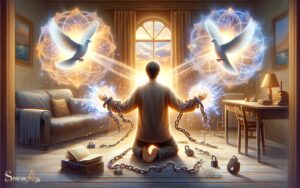Powers and Dominions Angels Demons and Spiritual Warfare
Powers and Dominions refer to the hierarchy of angels and demons involved in spiritual warfare between good and evil forces.
In many religious and spiritual belief systems, Powers and Dominions represent high-ranking celestial beings, with angels serving as protectors and messengers of good, while demons work towards destruction and chaos. Spiritual warfare refers to the ongoing conflict between these entities as they influence human lives.
While we may not see these forces at play, spiritual warfare is a constant battle between angels striving to direct us towards righteousness and demons attempting to lead us astray.
By becoming aware of this battle, we can better equip ourselves to resist temptation and seek divine guidance in our daily lives.

Key Takeaway
Powers and Dominions Angels Demons and Spiritual Warfare Category
| Category | Angels | Demons | Spiritual Warfare |
|---|---|---|---|
| Nature | Heavenly beings | Fallen angels | Conflict between good and evil |
| Origin | Created by God | Created by God, but became evil | Result of fallen angels’ rebellion |
| Primary Objective | Serve God and protect humans | Harm humans and oppose God | Struggle for human souls |
| Abilities | Deliver messages, perform miracles | Temptation, possession, deception | Prayer, faith, resistance |
| Hierarchy | Archangels, Seraphim, Cherubim, etc. | Satan, High-ranking demons, etc. | Spiritual armor of God |
| Examples | Michael, Gabriel, Raphael | Lucifer, Beelzebub, Asmodeus | Ephesians 6:10-18, 1 Peter 5:8-9 |
| Biblical References | Hebrews 1:14, Psalm 91:11-12 | 1 Peter 5:8, Ephesians 6:12 | 2 Corinthians 10:3-5, James 4:7 |
Angelic Hierarchies Explored
Within the study of angelology, the concept of angelic hierarchies presents a structured cosmos filled with celestial beings arranged in specific orders of precedence and power.
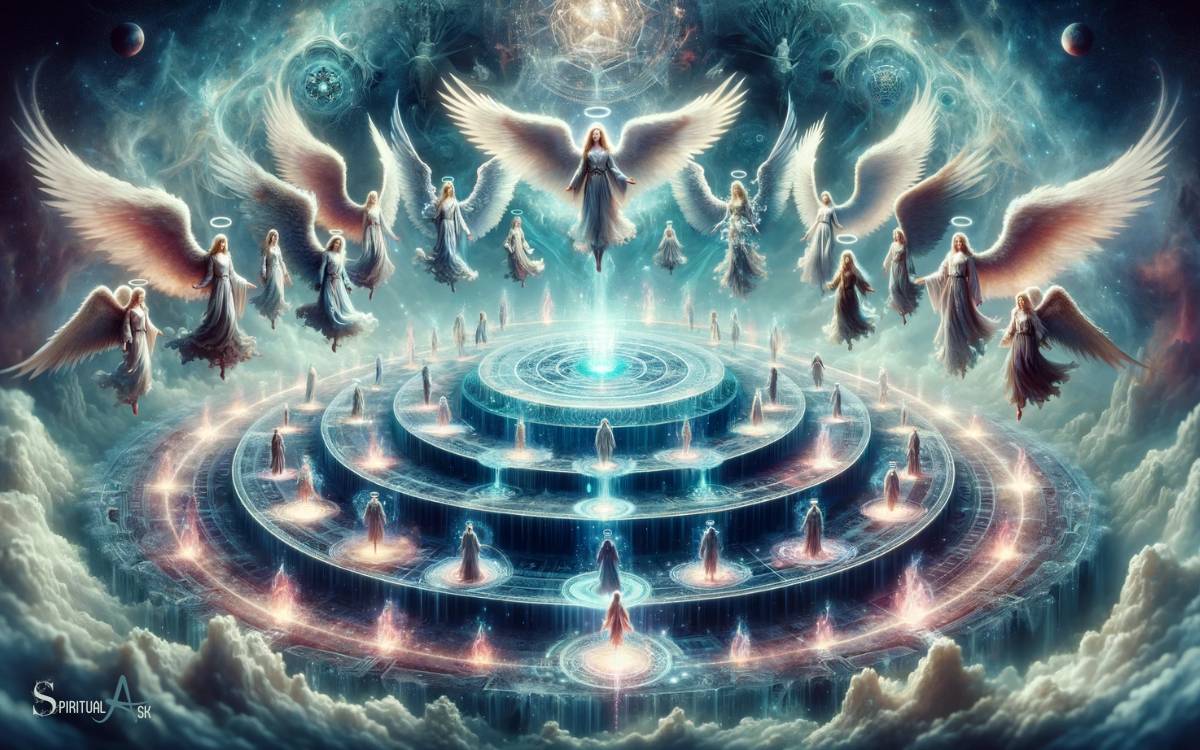
You’ll find that theologians and scholars have long debated the intricacies of these hierarchies, often drawing upon sacred texts for insight.
The most influential model, attributed to Pseudo-Dionysius the Areopagite, categorizes angels into three spheres, each containing three orders or choirs.
The first sphere, considered the closest to the Divine, encompasses Seraphim, Cherubim, and Thrones. These beings serve as God’s caretakers of the throne and divine governance.
The middle sphere includes Dominions, Virtues, and Powers, which oversee the cosmos and guide lower angels.
The third sphere, containing Principalities, Archangels, and Angels, interacts more directly with human affairs.
Understanding this celestial structure deepens one’s appreciation of the complex theology underpinning angelology.
The Nature of Demonic Forces
Shifting focus from heavenly to infernal, let’s delve into the nature of demonic forces, traditionally seen as malevolent entities that stand in stark opposition to the angelic orders.
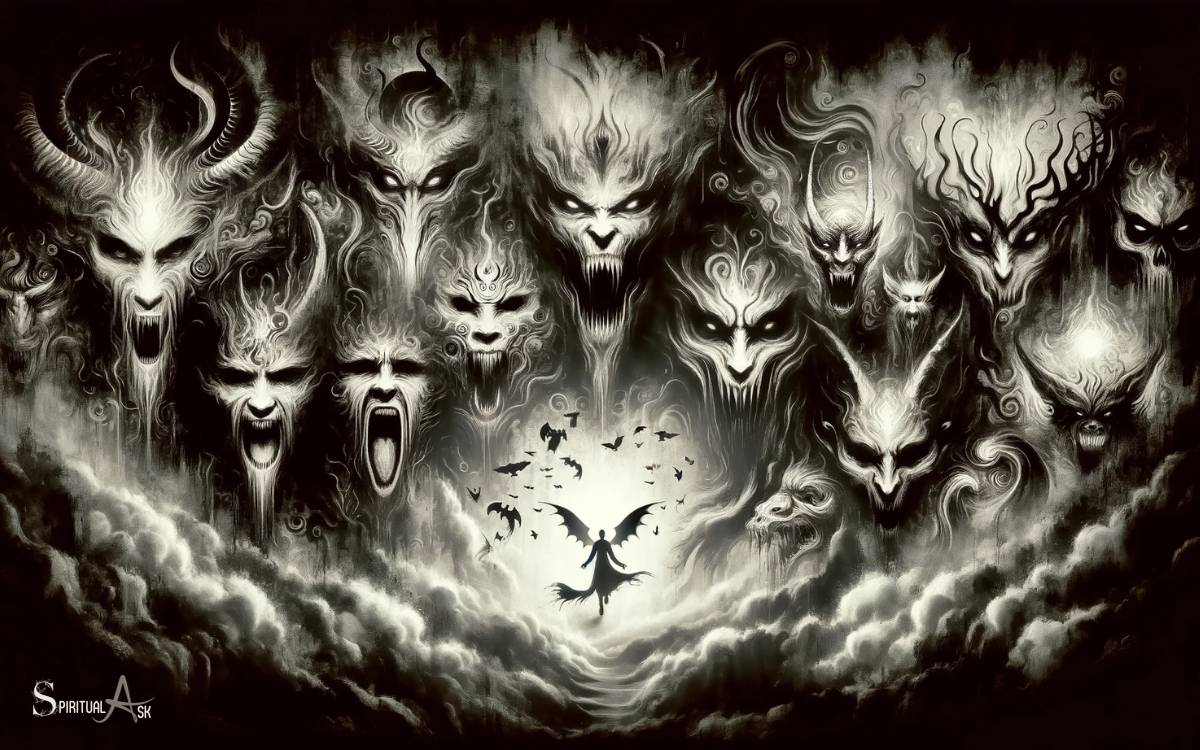
You need to understand that these forces are not just symbols of evil; they represent a complex concept within spiritual belief systems.
Demons are often depicted as fallen angels, but their characteristics and actions vary across different cultures and religious texts.
| Aspect | Description | Significance |
|---|---|---|
| Hierarchy | Demons are believed to have a structure similar to angels but | |
| inverted in purpose. | Indicates organized opposition to good. | |
| Intent | Their primary aim is to subvert and corrupt the moral order. | Highlights the struggle between good and evil. |
| Influence | Demonic forces are thought to tempt and deceive humans. | Suggests an active role in human affairs. |
In this analytical examination, it’s crucial to approach these entities not as mere myth but as integral to the theology of spiritual warfare.
Historical Accounts of Spiritual Battles
You’ve encountered various ideologies about the unseen realm; now, you’ll examine historical accounts of spiritual battles that have shaped religious and cultural narratives.
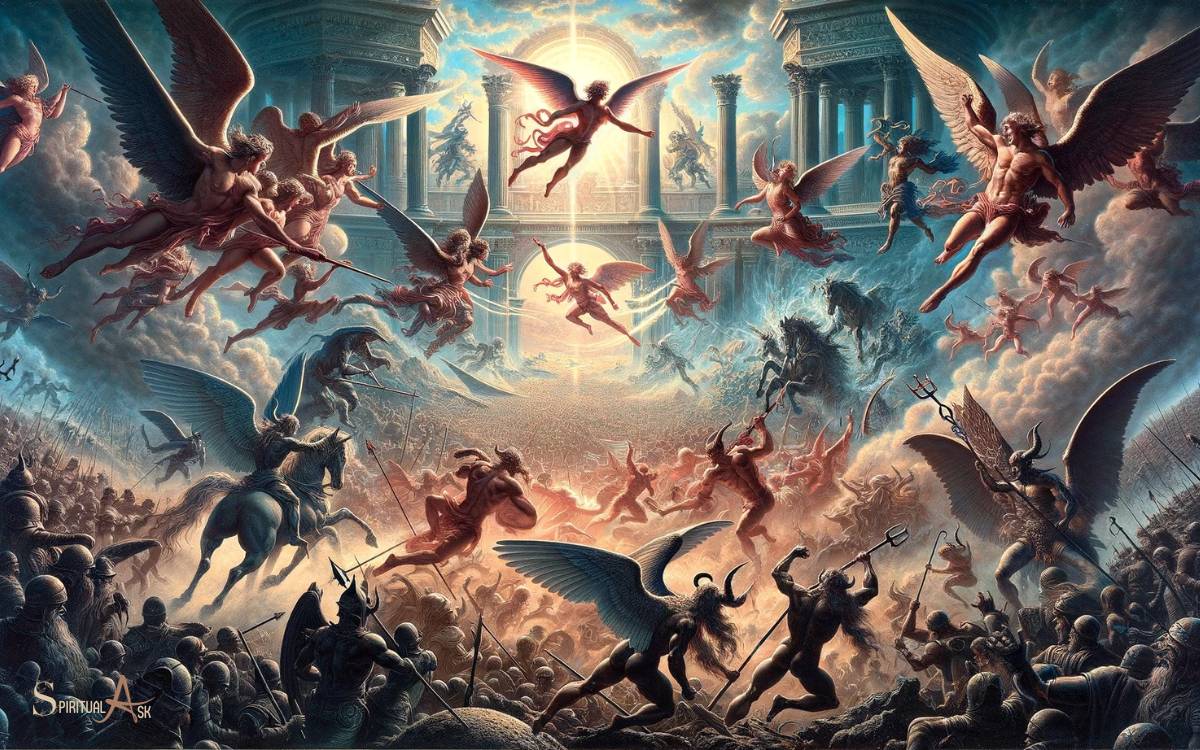
Consider the biblical battle narratives that provide the earliest descriptions of such encounters, and reflect on how exorcism practices throughout history signify a persistent belief in the need to combat malevolent spirits.
Lastly, assess the impact of legendary spiritual conflicts on both ancient and modern societies, highlighting their enduring influence on collective consciousness.
Biblical Battle Narratives
How do the historical accounts of spiritual battles in the Bible reflect the underlying theological perspectives of good versus evil?
The narratives often present a dualistic cosmos where divine forces of righteousness engage in cosmic battles against malevolent entities.
This dichotomy underscores the perpetual struggle between light and darkness, a central theme in many spiritual traditions.
| Battle | Imagery |
|---|---|
| The Fall of Lucifer | A celestial rebellion in heaven. |
| Daniel’s Prayer | Angels contending with princes. |
| Armageddon | The ultimate clash of kingdoms. |
These stories serve as a backdrop for moral and spiritual lessons, providing a framework for understanding the complexities of spiritual warfare.
They invite you to contemplate the profound influence of invisible forces on historical events, emphasizing the importance of faith and divine intervention in the pursuit of goodness.
Exorcism Throughout History
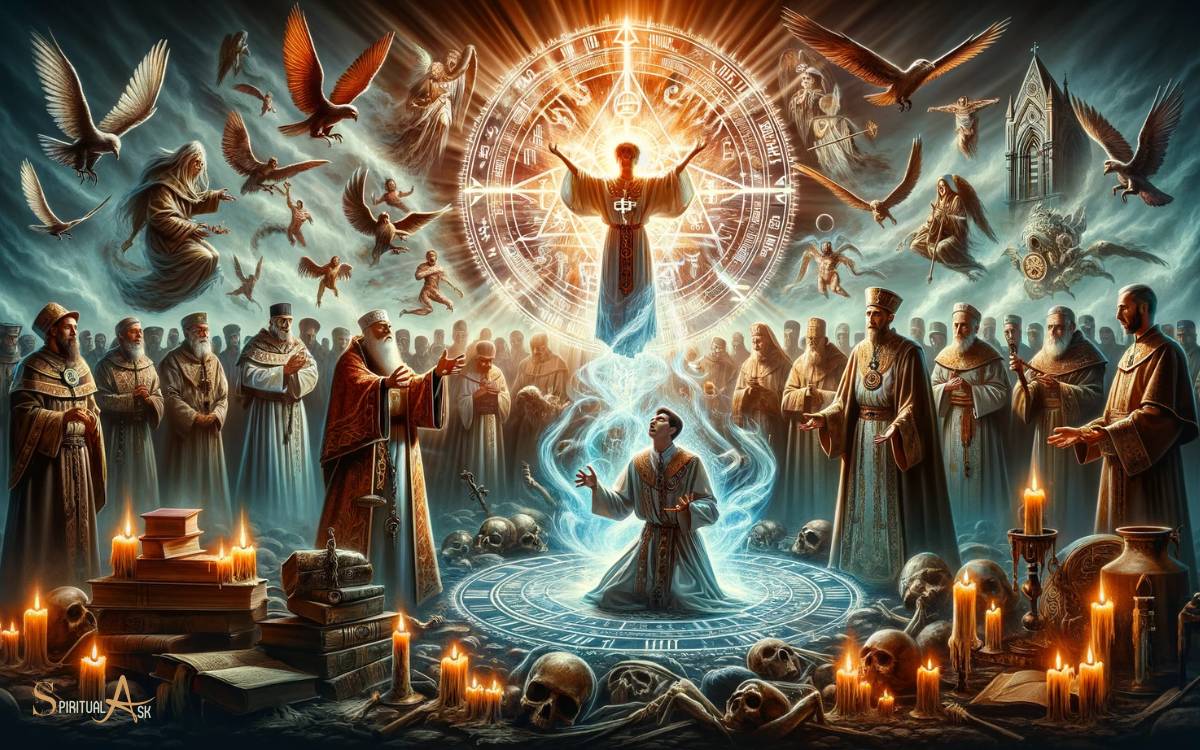
Throughout history, exorcism has been practiced as a ritualistic response to what were perceived as manifestations of evil spirits in individuals, reflecting a tangible aspect of spiritual warfare across various cultures and religions.
You’ll find that these rites, often deeply embedded within religious traditions, served as a means to confront and dispel the forces of darkness that were believed to afflict the possessed.
Analyzing these practices reveals a persistent belief in a spiritual realm where battles between good and evil are waged for the souls of humans.
Exorcisms, therefore, are not merely cultural artifacts; they represent a profound engagement with the metaphysical, an aspect of human experience that persists even in contemporary societies.
As you delve deeper, it’s evident that exorcistic rituals have evolved, yet their core intention remains as a testament to humanity’s enduring search for liberation from malevolent influences.
Legendary Spiritual Conflicts
Historical records and mythologies are replete with tales of epic spiritual battles, where deities, angels, and demons clash in cosmic conflicts that shape the beliefs and narratives of civilizations.
These legendary spiritual conflicts often serve as allegories for moral and existential struggles, reflecting the values and fears of the societies that conceived them.
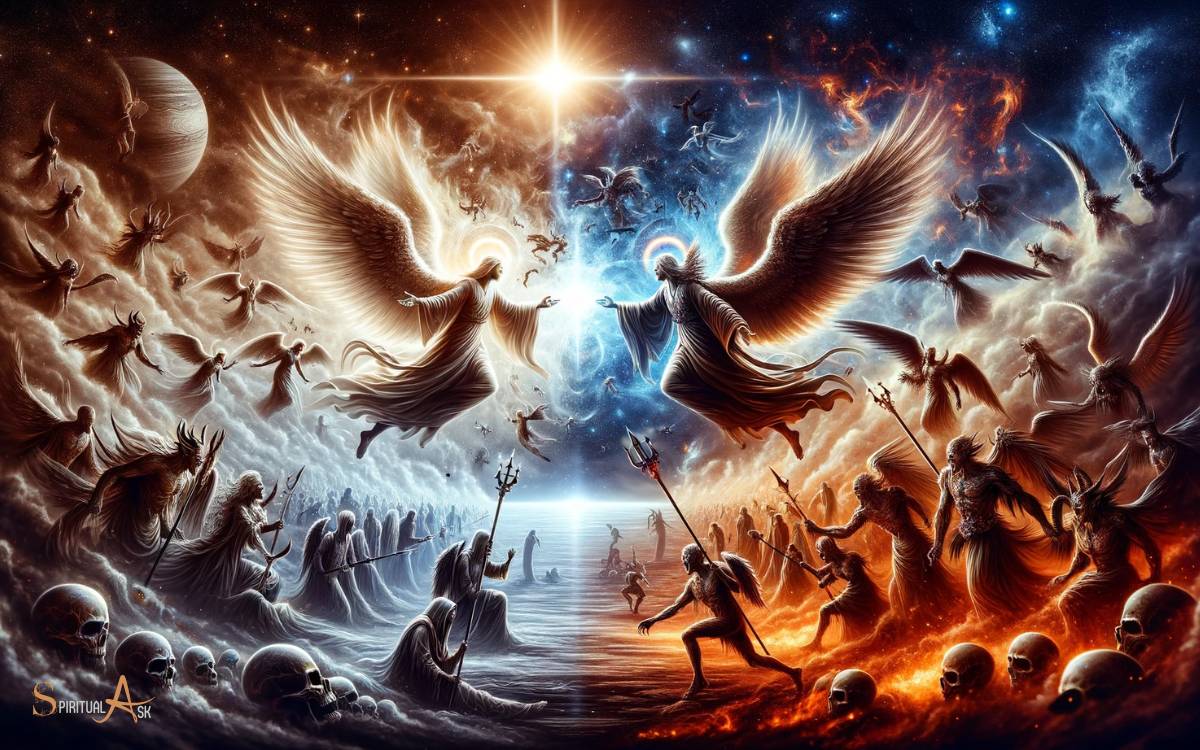
Analyzing these narratives offers insight into the human psyche and the perennial confrontation between good and evil.
| Conflict | Tradition | Significance |
|---|---|---|
| War in Heaven | Christian | Represents the fall of Lucifer and the eternal struggle between good and evil. |
| Ragnarok | Norse | Symbolizes the cycle of destruction and rebirth, encapsulating the fatalistic worldview of the Norse. |
| Battle of Kurukshetra | Hindu | Embodies the ethical and moral dilemmas inherent in duty and righteousness. |
| Ten Egyptian Plagues | Judaic | Illustrates the power struggle between God and earthly rulers, affirming divine supremacy. |
| Titanomachy | Greek | Depicts the overthrow of an older pantheon, signifying the shift from chaos to order. |
These accounts, while varied in origin and detail, underscore a universal theme: the metaphysical battle between forces of light and darkness.
Understanding Spiritual Warfare
To grasp the concept of spiritual warfare, one must delve into the multifaceted belief systems that depict the ongoing struggle between good and evil forces beyond the physical realm.

This conflict isn’t merely a metaphor but is often understood as a literal battle involving angels, demons, and human souls.
You’ll find that theologies across various cultures and religions propose the existence of an unseen war, each with its own set of doctrines and narratives.
In analyzing spiritual warfare, it’s crucial to examine the theological underpinnings and scriptural interpretations that frame this cosmic contest. It’s about discerning the nature of the entities involved, the rules of engagement, and the ramifications for humanity.
By doing so, you’ll gain a nuanced perspective on how this spiritual conflict influences beliefs, behaviors, and worldviews.
The Impact on Human Existence
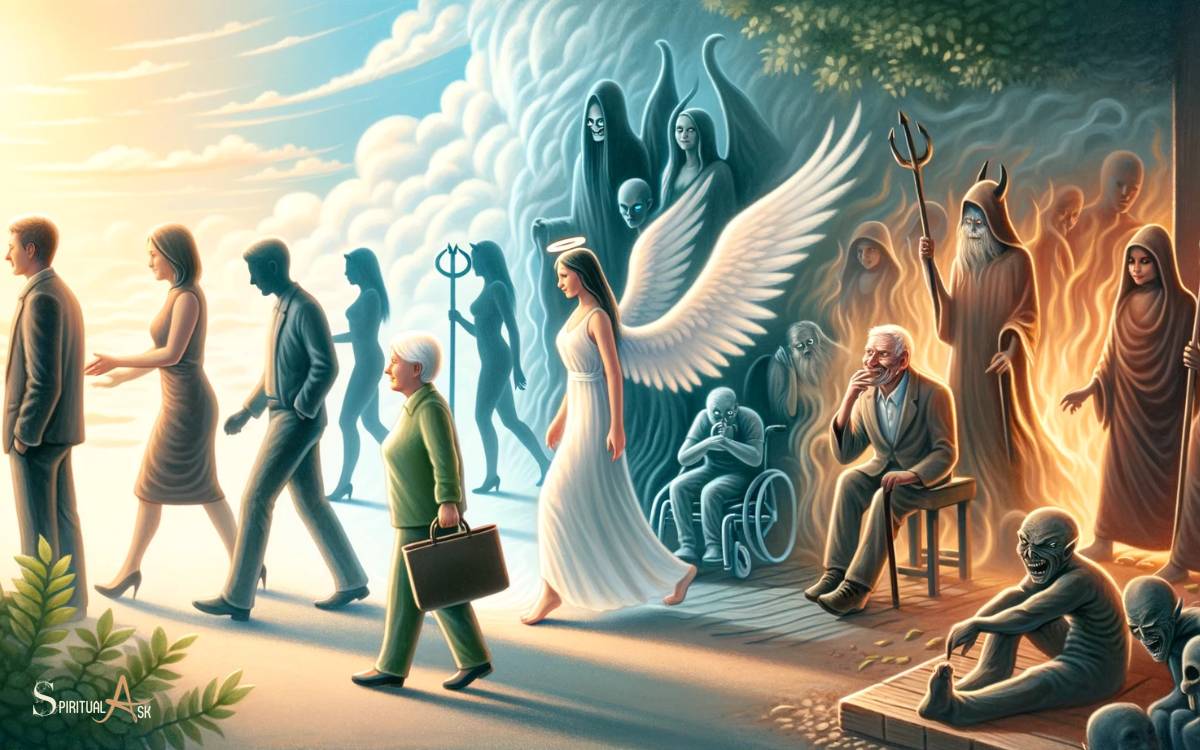
The belief in spiritual warfare exerts a profound influence on human behavior and societal norms, often shaping moral codes and personal convictions. You’re part of a society that structures much of its understanding of good and evil on these unseen battles.
This concept affects laws, cultural rituals, and even the governance of societies.
| Aspect | Influence on Society | Example |
|---|---|---|
| Morality | Defines concepts of good/evil | Ten Commandments |
| Cultural Narratives | Creates myths/legends | Archangel Michael stories |
| Personal Behavior | Guides ethical decisions | Acts of charity |
| Social Governance | Influences legal systems | Anti-witchcraft laws |
| Artistic Expression | Inspires literature, art | Dante’s Inferno |
Analyzing the impact, it’s evident that spiritual warfare is not just a theological concept but a foundational element that resonates through your everyday life, influencing actions and shaping worldviews.
Defense Mechanisms in Faith Traditions
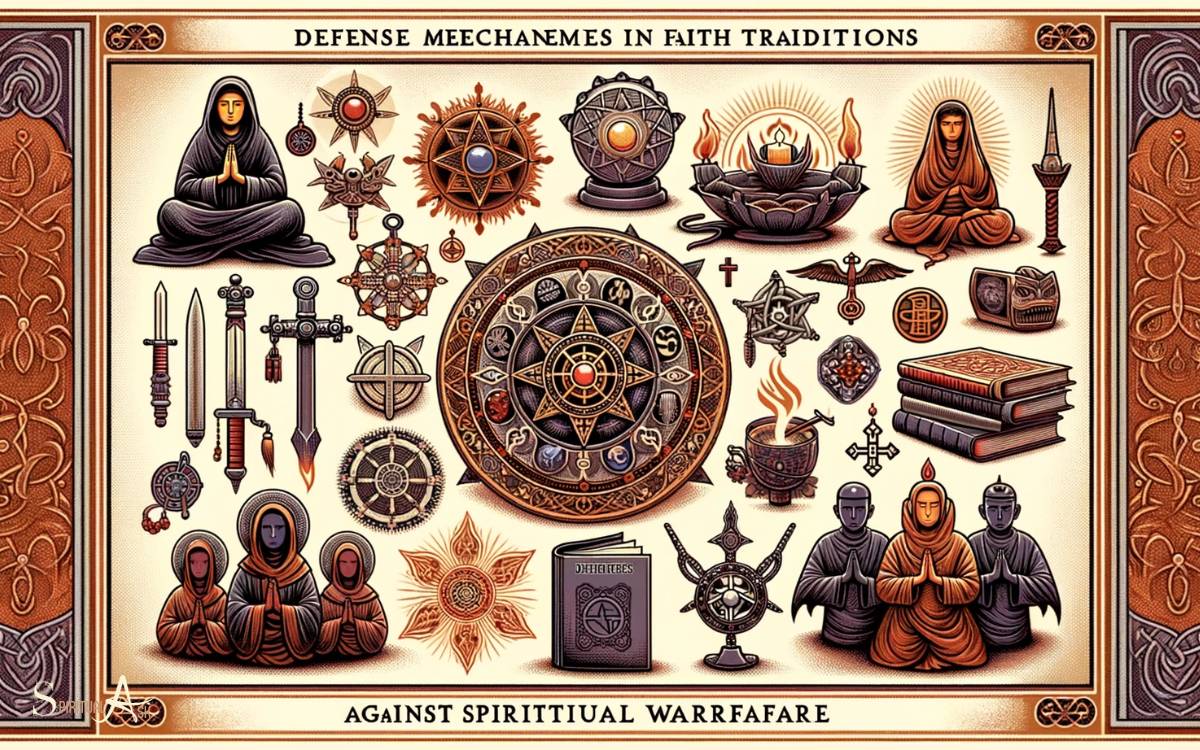
Within various faith traditions, adherents often employ specific practices and rituals as defense mechanisms against perceived spiritual threats. These practices are grounded in centuries-old teachings and are seen as vital for spiritual well-being and protection.
To understand these mechanisms, consider the following:
- Prayer and Meditation: Individuals seek divine protection through focused communication with a higher power, often invoking spiritual armor against evil.
- Sacred Objects and Symbols: Many rely on items believed to carry divine power, such as crucifixes, amulets, or holy water, which serve as tangible shields.
- Rituals and Sacraments: Ritualistic acts, like exorcisms or blessings, are conducted by religious authorities to cleanse, protect, or sanctify people and places from malevolent forces.
These elements reflect a structured approach to confronting spiritual adversities, emphasizing faith’s proactive role in personal defense.
Modern Perspectives on Ancient Struggles
Grasping the past’s spiritual conflicts, contemporary thinkers often reevaluate ancient texts and traditions to address today’s existential and metaphysical battles.
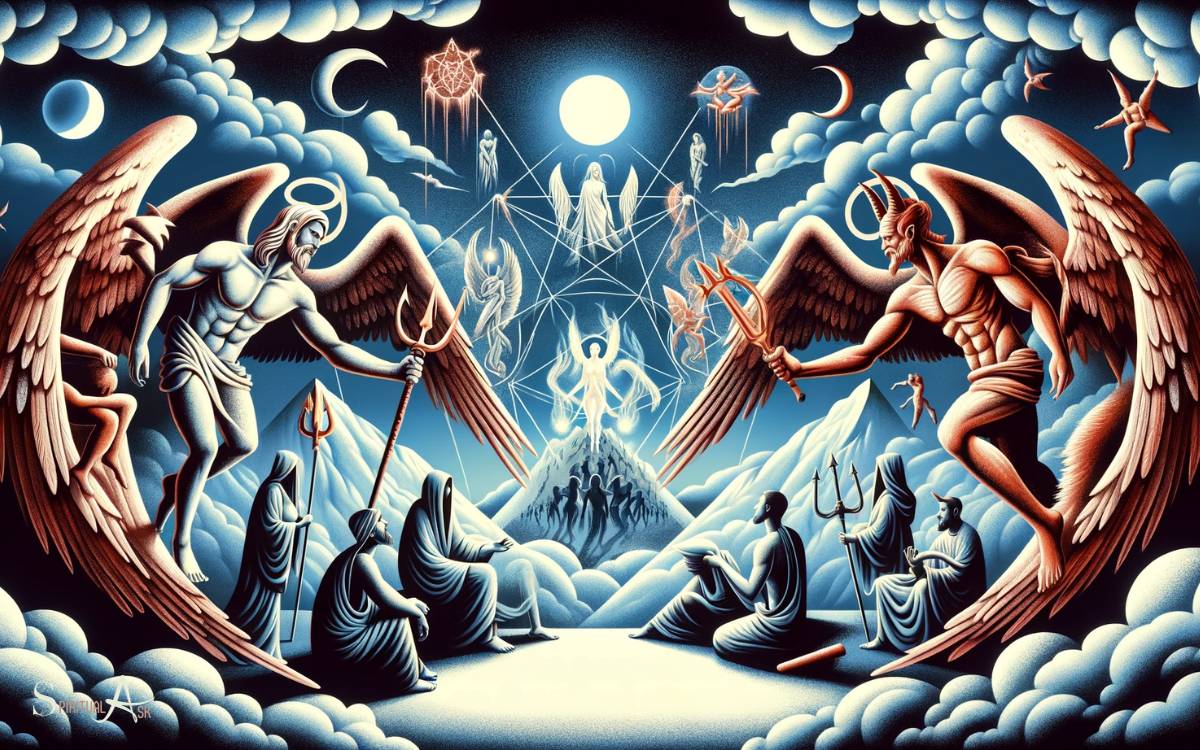
You’ll find scholars dissecting narratives of angels, demons, and spiritual warfare not as literal events but as allegories reflecting human psychology and societal structures.
This modern lens seeks to uncover the underlying messages that transcend specific religious contexts, aiming to apply moral and ethical lessons to contemporary issues.
Critics argue that ancient struggles, once seen as cosmic battles, mirror today’s clashes between ideologies and internal moral dilemmas.
You’re witnessing a shift from a literal interpretation to a metaphorical one, where demons represent personal vices and angels signify virtuous aspirations.
This nuanced understanding bridges historical beliefs with modern sensibilities, offering a framework for navigating the complexities of the spiritual and the secular in the 21st century.
What Are the Different Entities Involved in Spiritual Warfare According to the Bible?
In the biblical context, Secret Church Angels Demons And Spiritual Warfare encapsulates the battle between various spiritual entities.
Key players include:
- God: The ultimate source of power and authority, leading the forces of good.
- Satan: The main adversary, often depicted as the instigator of evil and chaos.
- Angels: Divine messengers and warriors who serve God and assist humans in spiritual battles.
- Demons: Fallen angels or malevolent spirits that oppose God’s will and work to lead humans astray.
- Humans: Central figures in spiritual warfare, who, with free will, choose sides in the cosmic battle between good and evil.
“Understanding the roles of these entities in Secret Church Angels Demons And Spiritual Warfare provides insight into the complex dynamics of spiritual battles.” Battling spiritual entities requires a deep understanding of the powers at play and the tactics that can be used to overcome them. By delving into the world of angels, demons, and spiritual warfare, individuals can gain valuable knowledge and strategies for navigating these supernatural conflicts. Ultimately, understanding the roles of these entities empowers individuals to engage in spiritual warfare with wisdom and discernment.
This delineation underscores the multifaceted nature of spiritual warfare, highlighting the invisible but impactful struggle influencing the moral and spiritual dimensions of human life.
Conclusion
In the vast tapestry of belief, you’ve glimpsed the celestial warfare that rages like a tempest unseen. Angelic hierarchies and demonic forces shape a hidden narrative, impacting human existence profoundly.
Your faith traditions offer shields and swords in this intangible struggle, while modern insights attempt to unravel these ancient enigmas.
As you stand at the crossroads of science and spirituality, remember that understanding such battles is as complex as it is crucial for the human spirit’s journey.
FAQ About Powers and Dominions Angels Demons and Spiritual Warfare
What are powers and dominions?
Powers and dominions are spiritual beings with authority to influence the physical world.
They can sometimes be referred to as principalities, authorities and rulers in the spiritual realm.
What is the difference between angels and demons?
Angels are typically seen as celestial and benevolent beings that serve God, whereas demons are seen as the opposite, typically associated with evil and chaos.
What is spiritual warfare?
Spiritual warfare is the struggle between good and evil, light and darkness. It is a spiritual conflict between God’s will and the activities and influences of evil spiritual forces.
How can we protect ourselves from spiritual warfare?
To protect ourselves from spiritual warfare, we put on the full armor of God and stay rooted in the Scriptures.
We need to pray, remain in fellowship with other believers, and continually ask God for His protection and guidance against such spiritual attacks.




